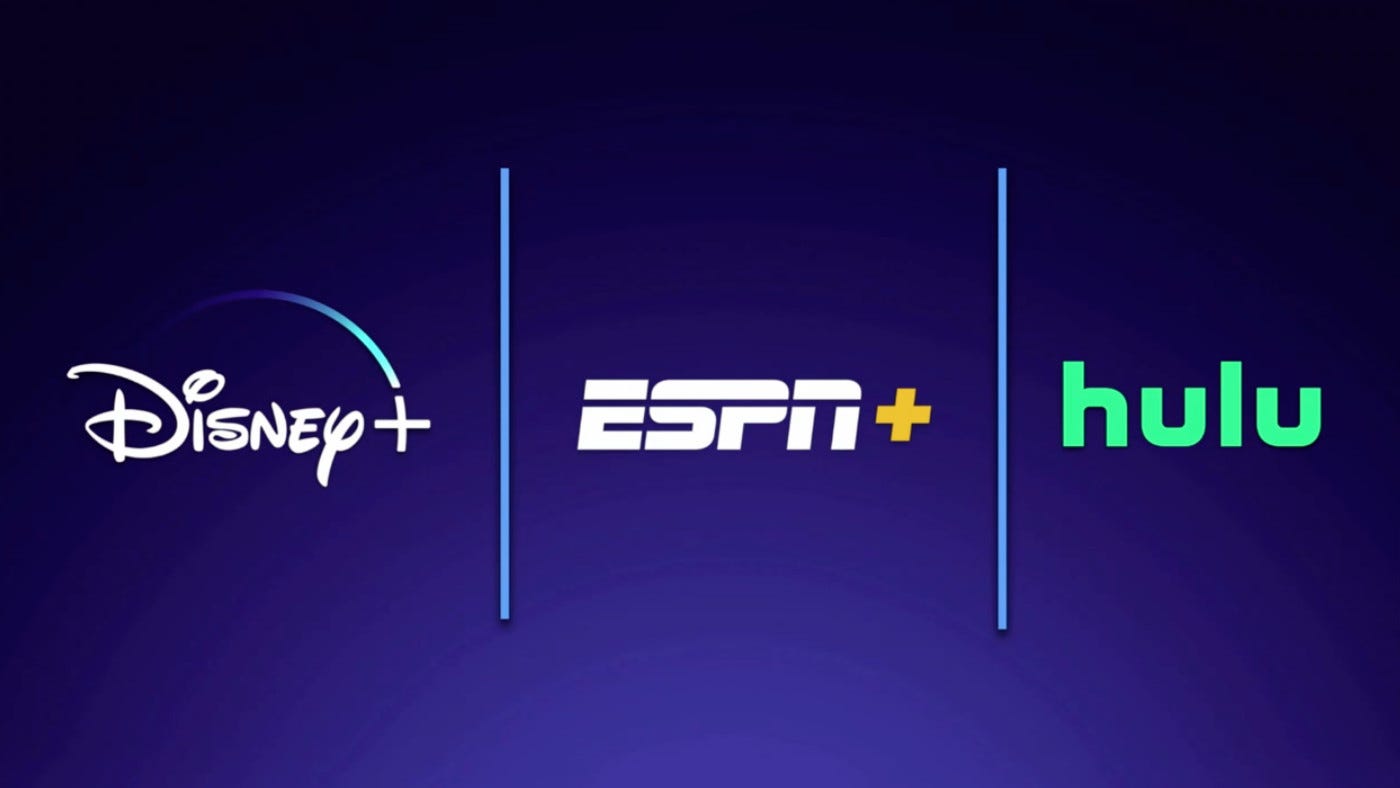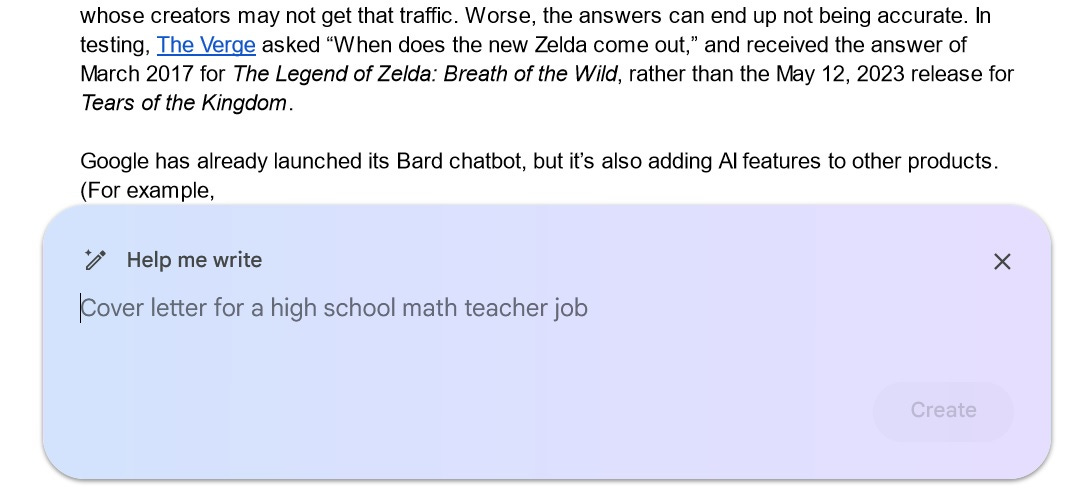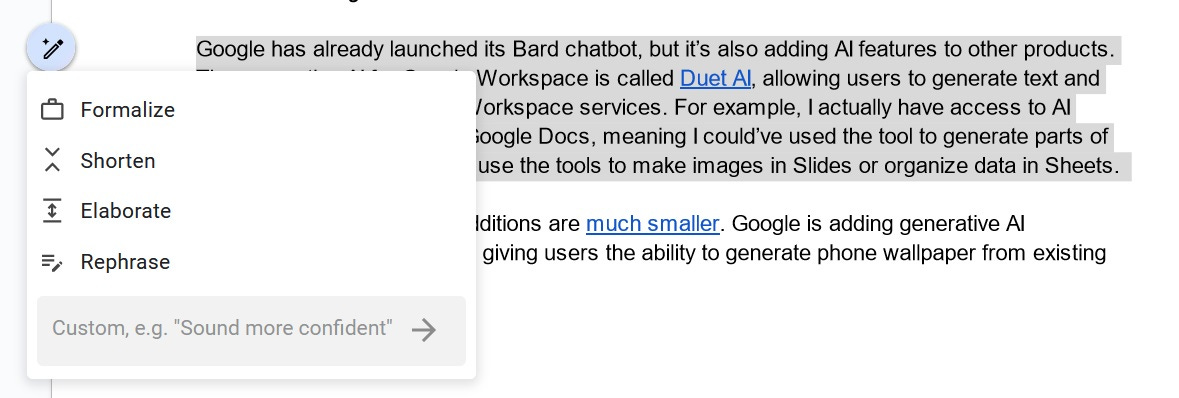Stuff Worth Knowing for the Week of May 8, 2023
The effects of the WGA Strike are felt, Google I/O 2023 is all about AI, and Twitter has a new CEO.
Welcome back to Stuff Worth Knowing! Each week, I'll round up news related to tech, video games, film, television, anime, and more. I’ll probably also start using Substack for more short-form thoughts once Substack Notes launches. At the same time, I’m going to be using my Patreon, SavePhile, more often.
Film, Television, and Streaming 🎞️
The WGA Strike Starts To Shutter Scripted Series
We’re moving into the second week of the Writers Guild of America strike. This means scripted shows in the middle of production are beginning to shut down, whether that’s because of picket lines or show staff striking. In the former category are shows like Severance, Daredevil: Born Again, and Billions, which are all a part of targeted picketing campaigns. In the latter category, there are shows like Power Book II: Ghost, HBO Max’ Pretty Little Liars: Summer School, and second Game of Thrones spin-off The Hedge Knight.
Andor showrunner Tony Gilroy came under fire on social media for continuing to work on the Disney+ show after finishing his writing duties prior to the strike, but this news seemed to be somewhat incorrect. “I discontinued all writing and writing-related work on Andor prior to midnight, May 1. After being briefed on the Saturday showrunner meeting, I informed Chris Keyser at the WGA on Sunday morning that I would also be ceasing all non-writing producing functions,” Gilroy said in a statement obtained by Deadline. Or perhaps the social media backlash worked.
In the face of the strike, major studios have also started to shift operations slightly. A number of production and first-look deals for writer-producers have been paused in response. The Wire creator David Simon tweeted that HBO suspended its long-running production deal with him, which he found out while he was on the picket line. Deadline states that Warner Bros. Television, Universal Studio Group, CBS Studios, Disney Television Studios, Netflix, and Apple have all sent notices to the representation for various writer-producers.
As the strike starts to set in, major television studios are also preparing for next week’s upfront presentations. Upfronts are when studios show off their major shows for the upcoming television season to advertising agencies, hoping to make significant ad sales depending on their portfolio of shows. This year is an odd one, with streaming muscling in on linear television, inflation changing buying habits, the pandemic forcing virtual presentations, and the strike threatening current show production. Streaming giants have started offering ad-supported services though, so the upfronts must go on.
With upfronts coming, studios have taken to cutting anything that doesn’t fit into current portfolios. ABC canceled The Company You Keep, Alaska Daily, and Big Sky; CBS cut True Lies, East New York, and S.W.A.T., before deciding to bring the latter show back for one final season; and The CW shuttered The Winchesters, Walker: Independence, and Kung Fu.
Why It's Worth Knowing: The networks are preparing what they’re calling “strike-protected” Fall seasons. This means leaning heavily on unscripted shows and acknowledging that the most of the Fall season on linear TV has already been shot.
“We have a lot of unscripted because we do have The Voice, and we have Saturday night football and Sunday Night Football, so that is a nice security blanket to have. But the truth is the business has changed so much in the last few years, and we are really on a year-round development cycle and production cycle,” NBCUniversal Television and Streaming president of entertainment program planning strategy Jeff Bader told Adweek. “We also have ready to go for the Fall if we need it, La Brea, Magnum P.I., Transplant, Weakest Link—so those are also available for the fall if the strike does go to the point where we need to start replacing shows.”
Of course, it all depends on how long the strike is going to go on, and whether The Directors Guild of America (DGA) and The Screen Actors Guild - American Federation of Television and Radio Artists (SAG-AFTRA) join in when their contracts expire on June 30.
Disney Planning To Merge Disney+ and Hulu Into a Single Service
One of the long-term questions in streaming is, “What’s going to happen with Hulu?” While the service began as a joint venture between Disney, NBCUniversal, and News Corporation (Fox), mergers have left Disney with 67% of the service, while NBCU holds the rest. There’s been a potential deal for Disney to buy the rest of Hulu from NBCU parent company Comcast for a fair market price starting in January 2024. The question has been: Does Disney even want Hulu?
It seems the answer has become an emphatic “yes”. This week, during Disney’s financial earnings call for the second quarter of fiscal year 2023, Disney CEO Bob Iger announced that the company would be offering a “one-app experience” combining Disney+ and Hulu.
“First, as a significant step toward creating a growth business, I'm pleased to announce that we will soon begin offering a one-app experience domestically that incorporates our Hulu content via Disney+,” said Iger. “And while we continue to offer Disney+, Hulu, and ESPN+ as stand-alone options, this is a logical progression of our DTC offerings that will provide greater opportunities for advertisers while giving bundle subscribers access to more robust and streamlined content, resulting in greater audience engagement and ultimately leading to a more unified streaming experience.”
The single-app will still require subscriptions to both Disney+ and Hulu, it’ll just place both sources of content on a single frontend. The combined app is coming at the end of the year, alongside price increases for Disney+’s ad-free tier. Disney will continue to offer Disney+, Hulu, and ESPN+ as separate services as well.
Why It's Worth Knowing: There’s a reason Disney isn’t just killing Hulu and merging the content in Disney+, like it does in other regions outside of North America. Hulu, as one of the older streaming services, actually has a sizable U.S. subscriber base. In terms of market share in the U.S., Hulu is second after Netflix: according to Antenna, Netflix controls 26% of the subscription video on demand (SVOD) market, while Hulu has 17%. So it behooves Disney to not kill Hulu and potentially anger its current customers. Instead, it’s hoping to pull viewers toward the current bundle, which gives ad-free Disney+, ad-free Hulu, and ESPN+ with ads for $19.99 per month.
Amazon Will License Its Original Shows and Films
Like a number of other companies with streaming services, Amazon is looking to sell some of the original films and shows originally made for Prime Video. The news came from an Amazon press release touting the creation of Amazon MGM Studios Distribution. This new division is meant to handle the licensing and distribution of MGM’s library in addition to a number of Amazon Prime Video originals.
Content mentioned in the press release include shows like Goliath and The Marvelous Mrs. Maisel, and films like Coming 2 America, The Tomorrow War, and Without Remorse. New MGM films will also be handled by the division, including the James Bond and Rocky/Creed franchises.
Why It's Worth Knowing: Amazon is looking to make money on its considerable slate of shows and movies. Prime Video has been an oft-forgotten add-on to Amazon Prime for a long time, but it does have a solid base of viewers thanks to shows like The Boys.
That said, there’s potential to make a ton of money by selling its shows to other services. It’s not hard to look at the success of something like Netflix’ The Night Agent and wonder if maybe Amazon could make a bit of cash putting the first season of Reacher on the same platform. And that’s only with older content. Who’s to say The Rings of Power might not land on Max in the future?
Streamers Removing Content And Cutting Spending
The good times in streaming are well and truly over. For a while, Netflix and others were throwing money at anything and everything. The economic picture is vastly different in 2023 however, leading many to start tightening the belt. During its earnings call for the second quarter of fiscal year 2023, Disney chief financial officer Christine McCarthy announced that the service would start removing certain content from streaming.
“We are in the process of reviewing the content on our DTC services to align with the strategic changes in our approach to content curation that you've heard Bob discuss. As a result, we will be removing certain content from our streaming platforms and currently expect to take an impairment charge of approximately $1.5 billion to $1.8 billion. And going forward, we intend to produce lower volumes of content in alignment with this strategic shift,” she stated. This is similar to what happened to Warner Bros. Discovery when CEO David Zaslav started cost-cutting.
This news came alongside a report from The Wall Street Journal stating that Netflix is planning to reduce content spending by $300 million in 2023. The move is meant to reach profitability now that the company has delayed its password-sharing crackdown into the second quarter of 2023.
Every major studio is also reversing course on exclusive shows for their streaming services. I mentioned Amazon doing so in the preceding story, but it’s being joined by Disney, Warner Bros. Discovery, and others in this strategic shift. Along with general cost-cutting and ad-supported tiers, this is another way to show profitability. It’s merely a matter of figuring out which shows and films to license and which ones you want to keep in-house; Paramount absolutely regrets licensing Yellowstone to NBCUniversal’s Peacock for example.
AI 🤖
2023’s Google I/O Was Largely About AI
On Wednesday, Google kicked off Google I/O 2023, focused on showing off the latest and greatest technology from the company. This year, while there were some hardware devices (see below), the focus was clearly highlighting new artificial intelligence additions. Google Bard, the all-new Search, and AI features for Android took the top spot at the keynote.
Search Generative Experience (SGE) is the new interface for Google Search, powered by the PaLM 2 large language model (LLM). Instead of offering the standard SEO-based search results upon any query, SGE instead tries to synthesize a comprehensive answer. In the live demo during the keynote, the SGE response to a query about vacations actually takes up all of the real estate where you would normally have the standard blue links. The SGE response doesn’t even have ads yet, which will likely take up even more screen real estate.
Google says the new Search will still drive traffic to sources on the web, but some, like myself, remain skeptical. “With this powerful new technology, we can unlock entirely new types of questions you never thought Search could answer, and transform the way information is organized, to help you sort through and make sense of what’s out there,” wrote Google vice president of Search Elizabeth Reid in a blog.
The problem is that the average person doesn’t stray beyond the top of Search results and now Google’s AI answers are taking up that space. It’s generating answers based on existing web content, whose creators may not get that traffic. Worse, the answers can end up not being accurate. In testing, The Verge asked “When does the new Zelda come out,” and received the answer of March 2017 for The Legend of Zelda: Breath of the Wild, rather than the May 12, 2023 release for Tears of the Kingdom.
Google has already launched its Bard chatbot, but it’s also adding AI features to other products. The generative AI for Google Workspace is called Duet AI, allowing users to generate text and images from within Google Workspace services. For example, I actually have access to AI assistance for drafts within Google Docs, meaning I could’ve used the tool to generate or rewrite parts of this newsletter. (Images above are literally from my draft of this newsletter.) You can also use the tools to make images in Slides or organize data in Sheets.
Over on Android, the initial additions are much smaller. Google is adding generative AI capabilities to Messages and giving users the ability to generate phone wallpaper from existing images and emojis. The beta for Magic Compose for Messages is apparently rolling out this summer.
Why It's Worth Knowing: Everyone is aiming for “AI” as the new tech buzzword, but the focus feels misapplied. As an assistant, AI can be great; I do think some of these tools are useful, like allowing folks to rewrite sections of an email. (I use Magic Eraser for Google Photos all the time, for example.) I find the focus on adding AI to Search to be a bad idea, however, as it takes traffic from outlets that are actually creating solutions and answers. Combined with the potential hallucinations and inaccuracies, and it feels like a problem for a service that’s supposed to be focused on providing information. Getting the wrong answer with confidence isn’t what we should be aiming for.
Meta Announces ImageBind AI
Meta is behind on AI, as the company was previously focused on extended reality and the metaverse. This week, Meta showed off an open-source research project called ImageBind. This AI model is attempting to bring together different types of data, including text, images, video, audio, depth tracking, thermal readings, and inertial measurement units (IMU). The idea is supposedly to allow the model to somewhat understand context and create new content from inference.
“For example, using ImageBind, Meta’s Make-A-Scene could create images from audio, such as creating an image based on the sounds of a rainforest or a bustling market. Imagine that someone could take a video recording of an ocean sunset and instantly add the perfect audio clip to enhance it, while an image of a brindle Shih Tzu could yield essays or depth models of similar dogs. Or when a model like Make-A-Video produces a video of a carnival, ImageBind can suggest background noise to accompany it, creating an immersive experience,” said the company in a blog post.
Of course, that’s currently just hopes and dreams. Right now, it’s all research-focused. And while it is open-source now, as soon as commercial applications appear, they’ll likely be taken in-house. See OpenAI as an example.
Tech ⌨️
Google I/O 2023 Showcases New Pixel Devices
This week marked the annual Google I/O keynote, where the Alphabet company shows off its latest and greatest devices. While most of the keynote was focused on adding AI to several Google services (as shown above), there were some hardware announcements. There was the announcement of the budget-conscious Pixel 7A smartphone, but more importantly, Google revealed the Pixel Fold and the Pixel Tablet.
The Pixel Fold is Google’s premium folding smartphone, offering the first real competition to Samsung’s Galaxy Z Fold series. The Pixel Fold costs $1,799, with a 5.8-inch OLED outer screen that unfolds to showcase a 7.6-inch inner screen. The device is powered by Google’s Tensor G2 Titan M2 processor and 12 GB of RAM.
The real key here is Google making a version of Android crafted for folding devices. Samsung has had to make its own changes to the operating system, but Google building the tech into Android will help other manufacturers push similar devices. I don’t see folding phones as a huge category in the future, but options are good! (Of course, Apple is rumored to be prototyping such devices for 2024 and beyond.)
In contrast to the premium Pixel Fold, the Pixel Tablet is focused on a different market. The Pixel Tablet starts at $499 for the tablet itself and the charging dock. The specs are low-key, with a 10.95-inch LCD screen with 2560x1600 resolution and only 8 GB of RAM. The focus is usability: the dock turns the Tablet into a Google Home smartscreen. This makes the device a competitor to devices like the Amazon Echo Show or Meta Portal.
While this seems like a clever idea, the problem is that category of devices generally tops out at around $250. The Pixel Tablet is too expensive as a smart screen, but lacks the power and usability of a proper tablet. No one is going to turn to this over an iPad if the tablet functionality is their main focus.
Why It's Worth Knowing: The point of the Pixel line of products is applying some standards to Android devices. It’s Google saying, “This is the baseline in terms of power and functionality,” while also making sure that base Android supports related features. That makes the Pixel Fold very important for those who want more foldable phones and tablets. That said, the Pixel Tablet feels like a miss; just an entirely misaimed product.
Former ByteDance Executive Accuses Company of “Culture of Lawlessness”
It’s not great news for ByteDance, a company that’s already facing down scrutiny from the United States government, but one of its former employees is making some hard claims in court. According to the New York Times, former ByteDance U.S. head of engineering Yintao Yu alleges that he was fired when he raised concerns about stealing and profiting off other companies’ technology.
One of the allegations in Yu's lawsuit is that ByteDance's Beijing offices had a special unit of Chinese Communist Party members, sometimes known as the Committee, which monitored the company's apps. “The Committee maintained supreme access to all the company data, even data stored in the United States,” he stated in the complaint.
ByteDance contends that Yu’s employment was brief and his statements don’t reflect the company’s current operations. “Mr. Yu worked for ByteDance Inc. for less than a year and his employment ended in July 2018. During his brief time at the company, he worked on an app called Flipagram, which was discontinued years ago for business reasons,” ByteDance stated.
Why It's Worth Knowing: Yu’s statements are going to be used as further evidence of ByteDance’s potential malfeasance. It’s already under heavy fire from Congress, and these allegations, if proven true, continue to paint the company in a poor light.
This Week In Twitter: We Finally Have a New CEO
Way back in December 2022, Twitter owner Elon Musk put out a poll asking if he should step down as head of the company. Since then, Musk seemed to be dodging the implications of the poll. This week, it seems he finally delivered on part of the promise.
“Excited to announce that I’ve a new CEO for X/Twitter. She will be starting in ~6 weeks! My role will transition to being exec chair & CTO, overseeing product, software & sysops,” Musk said in a tweet on Thursday. Musk didn’t say who the new CEO was, but The Wall Street Journal followed up with a report that NBCUniversal head of advertising Linda Yaccarino was in talks to take on the role. Musk confirmed the story a day later.
The roles Musk is transitioning into remain at the forefront of managing the social media service, as it is essentially software. (This includes new features like implementing encrypted direct messages.) It’s unlikely he’ll take marching orders from Yaccarino. Where she will help is potentially sidestepping Musk’s less-professional actions, which has hit the company’s ad revenue. She’s the right executive to talk to other companies and make good of situations ruined by Musk himself.
Earlier in the week, former Fox News host Tucker Carlson announced that he would start hosting a new version of his news show on Twitter itself. This follows his unceremonious firing from Fox News two weeks ago. According to Axios, Carlson’s lawyers also sent a letter to Fox saying it could not bind the host to a non-compete contract preventing him from hosting a new show until January 2025.
Despite Musk’s protestations about “free speech”, the social media service revealed that it would be blocking tweets in Turkey related to the upcoming election. In response to allegations of censorship, Musk said that “the choice is to have Twitter throttled in its entirety or limit access to some tweets.” Which is fine, but Musk is the one that presented himself as a free speech absolutist.
In other Musk-related business, China ordered Tesla to recall 1.1 million vehicles over concerns about issues with braking systems.
Video Games 🎮
UK’s CMA Prevents Microsoft and Activision-Blizzard From “Acquiring Interest”
It’s been two weeks since the UK’s Competition and Markets Authority (CMA) decided to block Microsoft’s acquisition of Activision-Blizzard. Despite the previous focus on Call of Duty, the CMA felt that the acquisition would be anti-competitive in terms of cloud gaming.
This week, the UK regulatory body released an interim order that prevents Microsoft from acquiring interest in Activision-Blizzard, or vice-versa. Both companies would require “prior written consent” from the CMA in order to acquire any interest in the other. The order also applies to subsidiaries, preventing Activision-Blizzard from somehow selling its divisions to Microsoft piecemeal.
“We remain firmly committed to this deal and look forward to presenting our case to the Competition Appeal Tribunal,” a Microsoft spokesperson told BBC News.
A. Dylan Jadeja Replaces Nicolo Laurent As Riot Games CEO
This week, Riot Games announced that global president A. Dylan Jadeja will become the company’s next CEO later this year. Jedeja joined Riot Games in 2011 as Chief Financial Officer and became Chief Operating Officer in 2014, before transitioning to President in 2017.
He replaces Nicolo Laurent, who has been CEO since 2017. During his tenure, Riot Games was accused of gender-based discrimination and sexism. Those accusations led to a lawsuit, and eventually, a $100 million settlement to be paid to a number of former and current female employees. Laurent himself was accused of sexual misconduct, with Riot deciding to clear him after a review. Despite this, a report from Wired said that Laurent protected other employees accused of misconduct and harassment.
Summer Game Fest 2023 Announces 40+ Partners
With the cancellation of E3 2023, Geoff Keighley’s Summer Game Fest is now the main event in gaming this June. This week, the official Twitter account for the event announced 40+ partners who will be showcasing games at the event. The list includes PlayStation, Xbox, Electronic Arts, Activision, Capcom, Sega, Square Enix, Ubisoft, Warner Bros, CD Projekt Red, Bandai Namco, Epic Games, and Netflix.
Why It's Worth Knowing: A full Summer Game Fest event is just another nail in E3’s coffin. Shame.
Layoffs 👷
Paramount Reduces Domestic Team By 25%, Cuts MTV News
Paramount is undergoing a ton of changes at the moment. Right now, the company is looking to merge several divisions together, bringing Paramount Media Networks, Showtime, and MTV Entertainment Studios under the same umbrella. Of course, these mergers mean there’s going to be some consolidation and cuts.
In a memo obtained by Deadline, president and CEO Chris McCarthy called the layoffs a “strategic realignment”. “As a result, we have made the very hard but necessary decision to reduce our domestic team by approximately 25%. This is a tough yet important strategic realignment of our group. Through the elimination of some units and by streamlining others, we will be able to reduce costs and create a more effective approach to our business as we move forward,” wrote McCarthy.
These cuts also involved the complete shuttering of MTV News. The division has been reporting news with a music and pop culture focus since the late 1980s.
For the first quarter of 2023, Paramount reported a $1.2 billion operating loss. With relatively flat revenue year-over-year, most of that loss came from content spending in streaming. Operating losses in streaming came to $511 million for the quarter.
PlayStation-Backed Studio Cuts 90 Employees
This week, VGC reported that Deviation Games laid off as many as 90 employees from its studio. Deviation is a brand-new studio founded by former Call of Duty: Black Ops developers Dave Anthony and Jason Blundell. The team signed with PlayStation in 2021 to develop a new title, but Blundell left the studio in September of last year. Now a larger number of employees have been let go from the studio.
On My Mind 🧠
Viz Manga Launches New Subscription Service: After nailing the subscription manga business with its $2.99 per month Shonen Jump service, Viz Media is launching a second subscription. VIZ Media CEO Ken Sasaki dropped all the details on the service in a YouTube video. The new service, Viz Manga, will be open to more series outside of the fare that appears in Shonen Jump.
For $1.99 per month, users can get access to Case Closed, Komi Can't Communicate, Inuyasha, Uzumaki, and Call of the Night. Basically, if you want access to a wide variety of interesting and classic manga, it’s well worth the price.
Bigolas Dickolas Makes “This Is How You Lose the Time War” A Monster Hit: Book sales are weird. Sure you can do all the promotions and marketing, with posters, signings, and press junkets, but in 2023, it seems hoping for a social media hit is the way to go. TikTok made Colleen Hoover a mega best-seller last year, pushing four of her previously-published novels to the top of sales charts.
This year is the time of Wolfwood. More specifically, “Bigolas Dickolas Wolfwood,” a Twitter user and clear fan of the anime Trigun. The user tweeted an emphatic promo for “This Is How You Lose The Time War” by Amal El-Mohtar and Max Gladstone, originally published in 2019. The tweet went viral and the novel became Amazon #1 Best-Seller in Romantic Fantasy and #9 in the entire Books category.
El-Mohtar wrote in her blog about the situation:
As far as I can tell, someone going by the name Bigolas Dickolas Wolfwood runs a fan account for a 90s anime called Trigun which was recently rebooted, and tweeted about loving Time War with imperative enthusiasm, and somehow over the course of 24 hours that tweet went viral with people chiming in to say how much, how passionately, how violently they love the book, and it blew up, and despite the fact that Twitter Does Not Sell Books enough people bought our book in a short enough period that whatever algorithmic alchemy determines Amazon's best-sellers took notice, and the upshot of it all is that corporate marketing people at Simon & Schuster now know the name Bigolas Dickolas.












